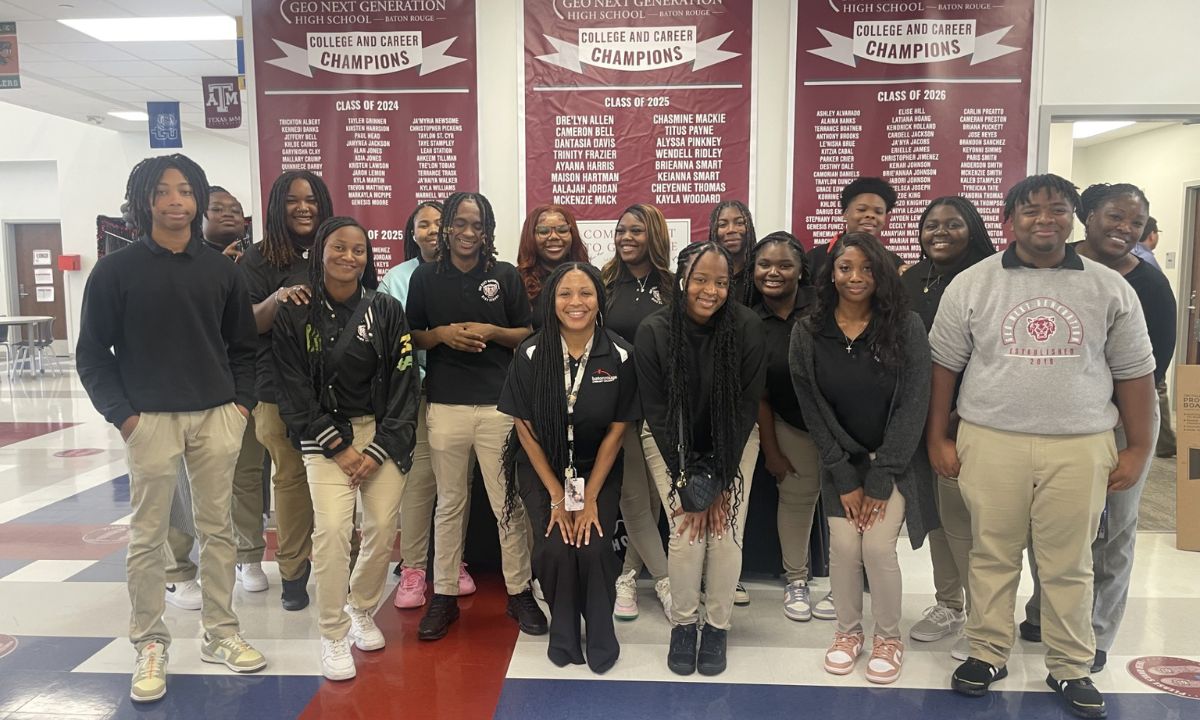Louisiana Charter Offers Affordable Path to a College Degree — in High School
Cohen: Baton Rouge's GEO Next Gen HS is a case study in reversing the decline in college degree attainment for African-American students

Get stories like this delivered straight to your inbox. Sign up for The 74 Newsletter
Though increasing the number of Black Americans earning postsecondary degrees has been a goal of education policy for decades, the number enrolled in college fell between 2011 and 2021 from 3.5 million to 2.8 million. GEO Next Generation High School, a charter school in Baton Rouge, Louisiana, and its partner, Baton Rouge Community College, offer a promising model that, if taken to scale, could turn around that decline.
GEO’s class of 2023 — the school’s first graduating class — set a strong baseline that current students are on track to beat: 100% of students graduated in four years, 40% of them finished high school with at least one full year of college credit and an additional 10% finished with a full associate degree. Two sisters illustrate GEO students’ drive and persistence. Quintasia McCray, a 2023 graduate, earned her associate degree and 76 college credits at Baton Rouge Community College by the time she finished high school. Now, her little sister is coming after her. Quinniese Darby, a GEO senior, has 58 college credits — but her goal is to beat Quintasia’s total.
By earning associate degrees in high school, the sisters can expect a median net gain in their lifetime earnings of $250,000 beyond what they could expect to make with a high school diploma. Combine this with additional credit hours and smart college advising on four-year degree programs, and they have already gone a long way toward earning the bachelor’s degrees that could help them earn almost $1 million more than a high school graduate over their lifetimes.
Of GEO’s 455 current students, 50% were enrolled in a community college course in fall 2023, and they paid nothing for their credits. The school uses per-pupil funding to cover all fees — books, transportation, enrollment and more. Though research estimates that early college usually cost an extra $1,000 per pupil per year, GEO, a public charter school, is making this work without additional funds. The college classes replace high school courses, so, for example, students taking English composition at Baton Rouge Community College can skip junior-year English at GEO. That means fewer high school teachers and courses, a key part of the school’s ability to fund community college costs. A pilot program, new this year, allows 25 seniors to take all their courses, whether for high school or college credit, at Baton Rouge Community.
Counselor Katie Grimes, who oversees the dual-enrollment initiative, says the secret to running a successful program for a population that many high schools would struggle to graduate is to set high expectations for students and not let them quit. “What I think adults need to understand about high school kids is that if you set a high standard, they’re always going to meet you there,” she said. “But you have to set it and be firm.”
Sitting at a table with six seniors, who are all on track to graduate with an associate degree, Grimes noted, “All of these kids in here have come to me several times, either mad or wanting to drop out of a class. I’m just, like, ‘No.’ They come to me with their internal fires, upset, and I just say, ‘No, you can do it.’”
Grimes walks the line between keeping students from quitting and being realistic about when early college might be too much. When ninth graders arrive, she looks carefully at their academics and behavior to determine whether they should begin college classes right away. But a slow start doesn’t keep them from trying later, at their own pace. To calibrate the experience, she gets to know each student as a person.
Looking directly at Phillip Derozan, a senior, she said, “Phillip and I had a tumultuous relationship at first. We were always fussing. I was threatening to kick him out of the program every week. I threatened it because I felt he just wasn’t there yet. But one day, it clicked. He came to me and said, “OK, Miss Katie, I want to do this. I want to earn my associate degree. What do I need to do?”
Another key ingredient is that students learn to tolerate and bounce back from failure. They are taking challenging, college-level courses, with adult college students. The high schoolers are not guaranteed a passing grade simply because they are young, or they try.
One by one, all six of the seniors named a college class they had failed. Anyla Fleming is taking college algebra for the third time. “This time, we’re going to do it,” she said. “It’s hard out there. It’s hard. But this time, I’m passing.”
Akeem Tillman, sitting across from Anyla, plans to take his associate degree to a four-year college to study mechanical engineering. When asked about the difference between college and high school, he said, “It’s more self-paced. You got to be on it. Nobody gonna be sitting there telling you, ‘You got to do this.’ ”
At the same time, GEO students know they have adults in their corner when they need support. When asked who they go to if they have a problem with a class, students immediately named three or four school staff members, including Grimes.
As education leaders explore new pathways to advanced learning in high school, the partnership between GEO and Baton Rouge Community College could be a model for other schools and communities. Sometimes, what works is obvious: set high standards for students and don’t let them quit, even if they stumble along the way; find a good postsecondary partner; and hire staff who are willing and able to see students for the young adults that they are.
Get stories like these delivered straight to your inbox. Sign up for The 74 Newsletter

;)
